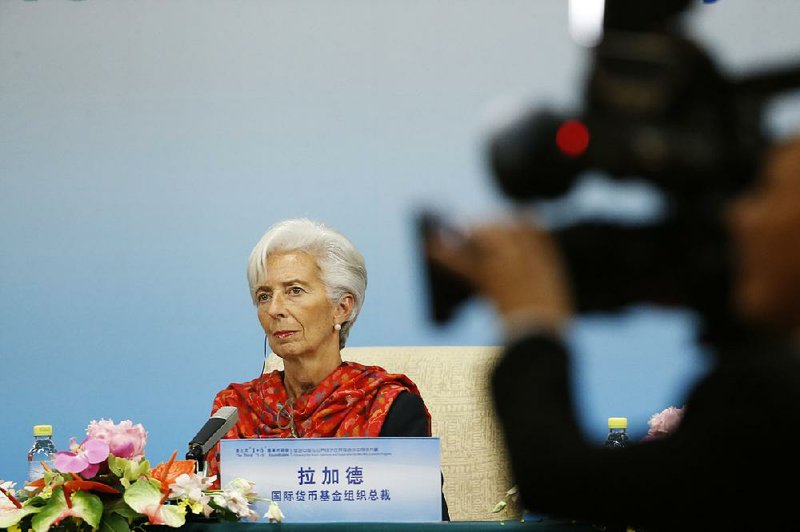BEIJING -- Leaders of the World Bank, International Monetary Fund and other global financial organizations warned Tuesday that trade tensions pose a growing risk for emerging economies.
With the U.S. and China embroiled in their worst trade conflict in decades, global growth has "plateaued and some downside risks have materialized," the leaders said in a joint statement issued after a meeting in Beijing.
"We are concerned about a further escalation of trade tensions, and the spillover effects on vulnerable emerging markets," the statement said, specifically mentioning employment as a concern.
The leaders said they were "very strongly concerned" about protectionism and one-sided measures and urged support for broader efforts such as the World Trade Organization.
Conflicts over technology policies and other trade issues have led the U.S. to impose tariffs on billions of dollars' worth of Chinese exports. China has responded in kind.
The disruptions to trade as companies adapt and prices rise are adding to pressures on China's leadership as the economy slows.
IMF Managing Director Christine Lagarde said the IMF forecasts that China's economy will grow at a 6.6 percent annual rate this year, slowing to 6.2 percent next year.
But she gave China's government credit for tackling some key troubles.
"Significant progress has been made in rebalancing the economy, slowing credit growth, addressing risks in financial sector and government off-budget borrowing, and continuing to open up the economy," she said in an address to the meeting.
The U.S. and China shouldn't let a lack of agreement on trade boil over into other aspects of cooperation, Singapore's Prime Minister Lee Hsien Loong said.
Trade issues between the superpowers are "genuine ones," and leaders of the two countries need to make decisions to resolve any conflict, Lee told Bloomberg Editor-in-Chief John Micklethwait in an interview Tuesday at the New Economy Forum in Singapore. Global trade issues need to be addressed or it could risk expanding into broader conflicts, he said.
"Both sides must want to reach a deal and then it can be worked out," Lee said, adding that the countries were reported to have been close to agreements which later faltered at the "top level."
U.S. President Donald Trump's move to put tariffs on $250 billion of Chinese goods in a bid to rebalance global trade has led to retaliation from China and exacerbated a raft of disputes, from human rights to U.S. military support for Taiwan. While Trump has floated the possibility of a deal when he meets China's President Xi Jinping in the coming weeks, they remain far apart on market access and government support for state-run enterprises.
"The leaders of the two countries have to decide what they want to do, and if it cannot be worked out, then I think you really want to keep it from boiling over, respond in a restrained way and try to keep things going and prevent this from poisoning the overall relationship," Lee said. "Because even between America and China, there are so many things where you have to work together, otherwise you are not going to get anywhere, starting with North Korea."
Chinese Vice President Wang Qishan -- a long-time ally of Xi -- told the New Economy Forum on Tuesday that China remained ready to discuss solutions to its trade war with the U.S. Wang also warned that China wouldn't again be "bullied and oppressed by imperialist powers," underscoring fears by business and political leaders on hand that rising nationalism in both countries would be harder to manage.
Trump has vacillated between optimistic and cautious assessments of a possible deal with China. He set up a call with Xi on Thursday, the first between the leaders in six months. On Monday, he said the trade conflict with China could still go either way.
An economist who accurately predicted the rising trade tensions between the U.S. and China now sees a likely resolution of the dispute next year.
A trade deal may be reached at some point in 2019 as tariffs will start to hurt the United States, Danske Bank A/S chief analyst and China economist Allan von Mehren wrote in a report last week, just before Trump tweeted that discussions with Xi are "moving along nicely."
After the tweet, the strategist now sees a 60 percent chance of a positive outcome from a planned Trump-Xi meeting at the Group of 20 summit in Argentina Nov. 30 and Dec. 1, up from 50 percent earlier, he said in an email response to questions on Thursday. A positive outcome would mean "a clear framework for negotiation with a list of demands and a plan to go work on them one by one."
Tensions may yet worsen before a deal can be reached, as Trump is likely to expand U.S. tariffs against Chinese imports, Mehren said. The U.S. is preparing to announce by early December tariffs on all remaining imports from China if talks at the G-20 meeting fail to ease the trade war, people familiar with the matter told Bloomberg.
"Trump's goal is a deal. Tariffs are just a weapon," Mehren said. "The tariffs and Chinese retaliation will also hurt the U.S. economy, so it is not sustainable."
Information for this article was contributed by The Associated Press and by Michelle Jamrisko, Stephanie Phang and Lillian Chen of Bloomberg News.
Business on 11/07/2018

